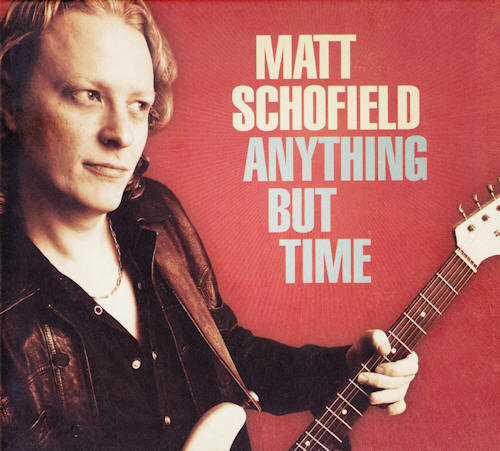
Painting © 2004 Loz
Arkle
Website
© Copyright 2000-2011 Alan White - All
Rights Reserved
Site optimised for Microsoft Internet Explorer
Early Blues Interview
|
|
|
_________________________________________________________________________ Alan: What are your first musical memories growing up in Manchester? Matt: I was born in Radcliffe and lived in Manchester for the first 7 years, hearing a lot of my Dadís blues records, he had a great vinyl collection. Albert Collins, BB King and Freddie King were about as modern as he got. But it was the electric blues guys that really got me so I always had Eric Clapton and Hendrix around the house. My Dad moved to America when I was 11 so I used to go out there in the summer for 6 weeks. He showed me a video of BB King, Albert Collins and Stevie Ray Vaughan jamming together and that was it for me. When I saw those three jamming together I decided that was what I was going to do and I've done it ever since and had a band within six months. Alan: Did you come from a musical family? Matt: No, Iím the first one. But my Dad plays a tiny bit of guitar but he listens to music like a musician does as opposed to a 'casual' listener. I remember when I was young heíd sit in his study listening with his headphones on and he also had a reel-to-reel tape recorder. So he taught me to listen, and to look for sources, so if I was listening to Stevie Ray Vaughan heíd say, ďOkay, but youíve got to listen to Albert King because that where itís fromĒ. So he taught me to look back. He was really influential in teaching me about music.
Matt: I just wanted to play. I wasnít worried about being a front man or a star but I just wanted to play, and make a living. When I left school I moved to London and joined Lee Sankeyís band, (great harmonica player from London) then there were other things and people and I was happy just to play and be involved in music every day. I also think you can tell when somebody has been through the school of backing somebody else up, it makes you more rounded musician and you pick things up, including what not to do sometimes as well. Alan: You then formed your own band, an unconventional trio with no bass, relying on the organ left hand bass instead - how did you first meet up with Jonny Henderson and Evan Jenkins? Matt: Johnny is from Gloucestershire, which is where I moved after Manchester, we went to the same school, a couple of years below me, and I was friends with his older brother. His brother played guitar and I used to go to his house and Johnny would be there on the piano. Itís 16 years since we did our first gig together. When I started out I did a little weekly residency at a club in London and one night we did it with the Organ Trio, with Johnny playing bass and I realised that this was something I could work with, make it my own band and find a context for my guitar playing. It felt good and it was different to everybody else.
Matt: The first record we recorded was a live album of covers with stuff like Albert Collins but we tried to find the non-usual stuff so there was a mix of Texas and Chicago blues and New Orleans funk. Weíd discovered a New York band called Soul Life who were a modern funk band and that was quite influential in the beginning. Alan: What does the blues mean to you? Matt: What does it mean to me? Well, itís everything really, itís me. Itís where I begin, where my career began. Iíve always played blues guitar and I just continue to so what Iíve always done. Itís everything, it's life, itís expression, itís a language that allows us to talk between ourselves.
Alan: Who has influenced you most in your music writing and playing? Matt: Oh, itís so vast at this point and thereís different sets of influences. My influences as a guitar player are one thing and then our influences as a band and the music that I write is probably broader than the guitar playing For guitar it's BB King, Albert Collins. Stevie Ray, Albert King, Freddie King, Muddy Waters, Jim Vaughan, Jimi Hendrix, Eric Clapton, and then later on Robben Ford, John Scofield. But then if you listen to Robben and you think ďWhereís he getting that from?Ē and realise a lot of itís jazz, not guitar, so listen to sax and piano, listen to Oscar Peterson's piano playing with Miles Daviesí Kind of Blue record being an important one for me, along with John Coltrane ... so all that reflects in your own instrument but hopefully in a positive way so that itís not the same as anybody else. Then musically thereís a lot of the New Orleans thing for us, Dr John and The Meters and all that kind of groove. Kevin Hayes [now the trio's drummer], I've listened to his playing since I started playing - on the records with Robert Cray for about 19 years, so it all comes together. Alan: Are there any particular songs you play that have special significance for you? Matt: I always include at least one tune from one of my heroes in a gig and also on the record Iíve got a long list of songs that Iíll get round to recording, and itís usually a song by BB or Freddie King or Albert King. I feel I have to do something by one of those guys every night so no matter how far we go with our interpretation we can always bring it back to that.
Alan: Moving on to guitars, youíve got a í61 Fender Stratocaster and the SVL 61 Custom I believe. Matt: I donít tour with my old Strad anymore, the airlines have just lost it too many times. But Simon here, my tour manager, is also SBL so he made the first guitar that made me able to retire my old Strad, and heís known me and my music for 20 years so he was able to come up with this that Iím very comfortable with and I donít have to worry about the old one anymore. Alan: You've produced three of Ian Siegal's albums (Meat & Potatoes, Swagger, and Broadside), do you enjoy the production side and do you plan to do more? Matt: I do, and itís a lot easier to do for somebody else than it is for yourself. Itís really just a scheduling thing these days and we are so busy playing and touring that I donít get much time, but Iíd like to be able to do more of it.
Matt: It was produced by John Porter in New Orleans, and it was a great experience. Firstly New Orleans is amazing and Iíd never been before so used to hang out a lot which added to the vibe. John is a lovely bloke, and the first time I met him he said, ďI think weíd have a lot of fun making a recordĒ which I thought was a great idea because Iíd not really had fun making a record before and itíd always been rather stressful. So I completely gave it over to him. Iíve always been a bit of a control freak about my records before but I thought, ďYou know what, he knows what heís doing and Iím just going to play guitar and sing. It was also the first record weíd done with Kevin since he joined the band a couple of years ago, so it was good to have the latest version of the trio. Alan: You are known for your 'tone and technique' and also for your eclectic approach, tell me a little about how you balance your musical styles. Matt: I donít really think about to be honest and I guess the easiest way to think about it is that we play everything we like and that excites us, take it all and bring it out as ourselves. Itís really as simple as that and itís not like a hugely conscious thing. Alan: You received the British Blues Award for Best Guitarist in 2011 and 2010, alongside Jonny Henderson for Best Keyboard player, and in 2010 for Best Album 'Heads, Tails and Aces', quite an achievement for the band, especially with 'Anything But Time' now eligible for 2012. Matt: Apparently so, Itís really good, especially as British Blues Awards is voted for by the fans. All the critical acclaim is great but it means a lot when people step up and say, ďWe were enjoying thisĒ. Alan: You are now on another tour, Burnley, Edinburgh, then over to New York, Pennsylvania. How does the US blues scene compare with the UK? Matt: Itís very different. You have to think of the US as the whole of Europe so each state is a different country with the same language. Itís that big and broad. I like playing out there. The audiences are certainly more overtly enthusiastic. Iíve spent many years here thinking, ďOh, they hate usĒ but it does change the way you play if you get a lot of energy back. It's nice that people are listening but the Americans are just a bit more vocal and I must say I do like that. Itís perhaps more in the fabric of society out there. Itís different to the UK, but both are good. Alan: Many thanks Matt, and good luck with the forthcoming tour and new album. _________________________________________________________________________
"With this album Schofield takes on the challenge
of a more diverse palate of songs, fitting his stellar guitar playing
into new frameworks. The end result is an exciting and contemporary
fusion of blues, funk and rock that is undoubtedly Schofieldís best work
to date.
"Matt is the most talented
guitarist I have worked with in a long while." Nugene Records www.nugenerecords.com _________________________________________________________________________
Return to
Blues Interviews List |








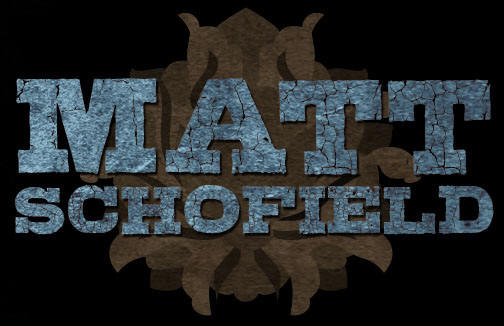
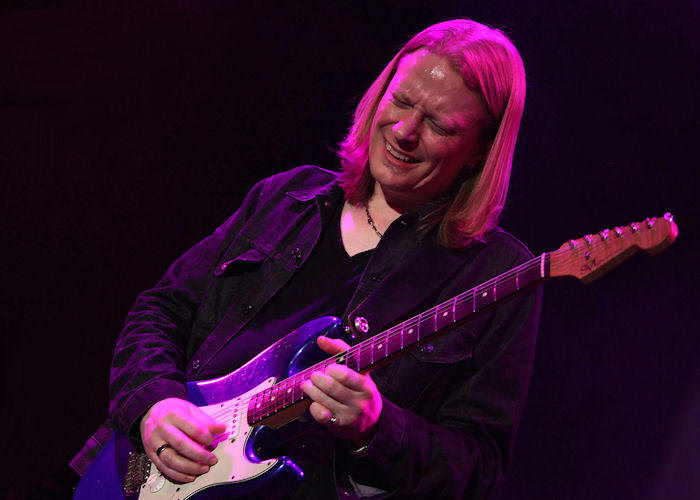
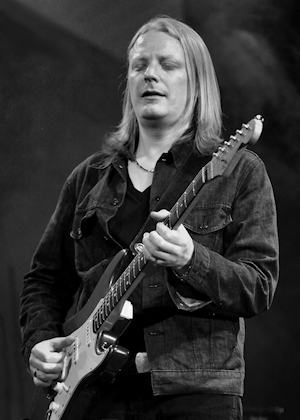 Alan:
You started your musical career as a sidesman and then spent four
years touring with Dana Gillespie, was this to gain experience rather
than starting your own recording career?
Alan:
You started your musical career as a sidesman and then spent four
years touring with Dana Gillespie, was this to gain experience rather
than starting your own recording career? 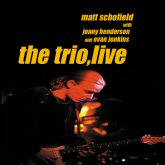 Alan:
What kind of material were you playing then?
Alan:
What kind of material were you playing then?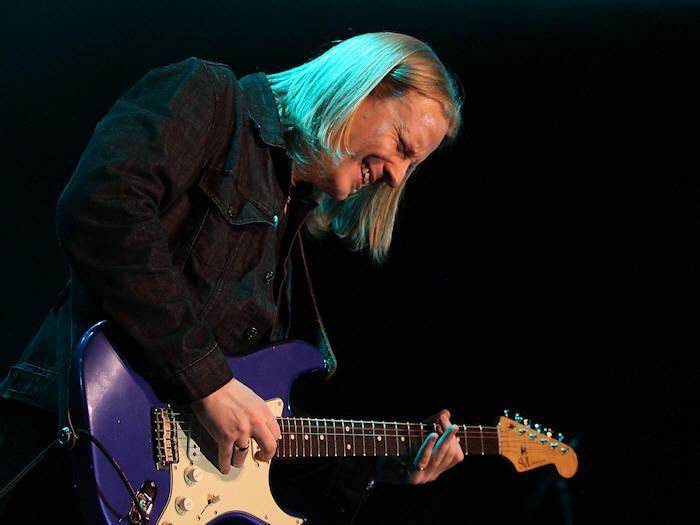
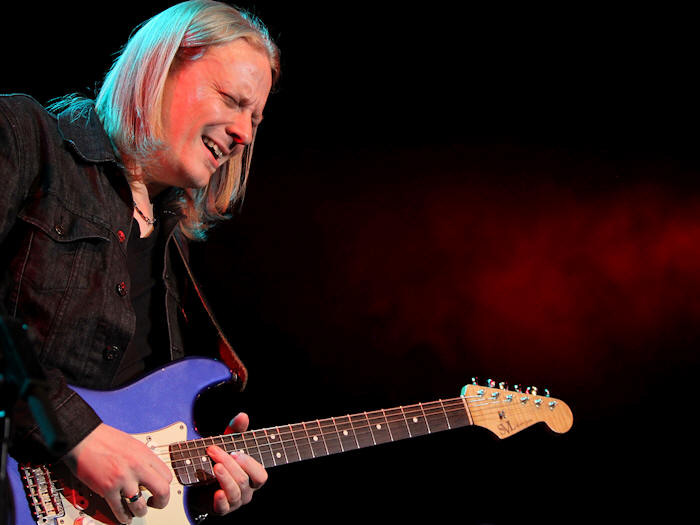
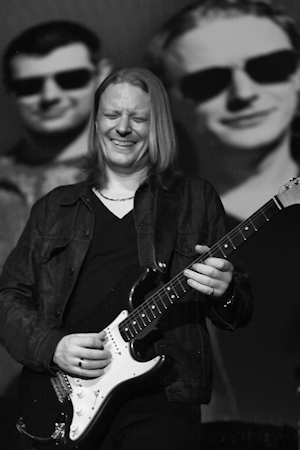 Alan:
Tell me about the making of your latest album 'Anything But Time',
produced by John Porter in New Orleans with guest Jon Cleary I believe?
Alan:
Tell me about the making of your latest album 'Anything But Time',
produced by John Porter in New Orleans with guest Jon Cleary I believe?